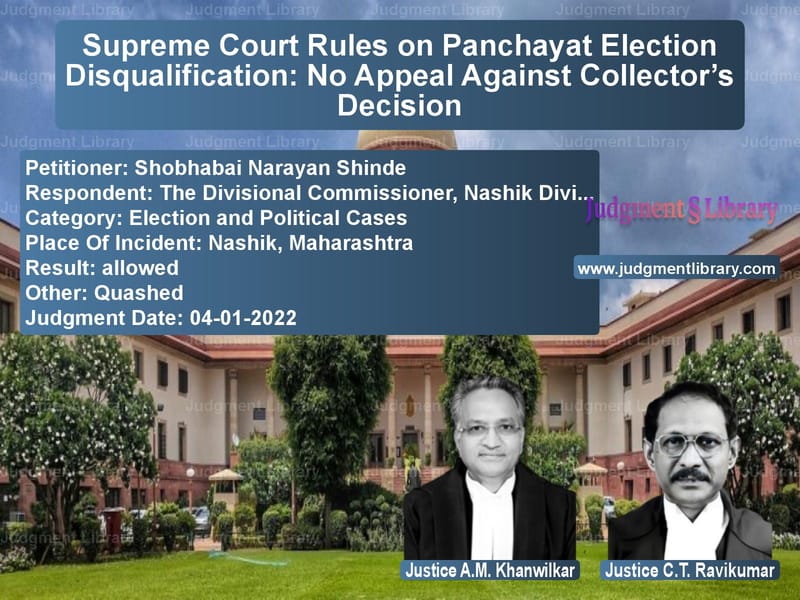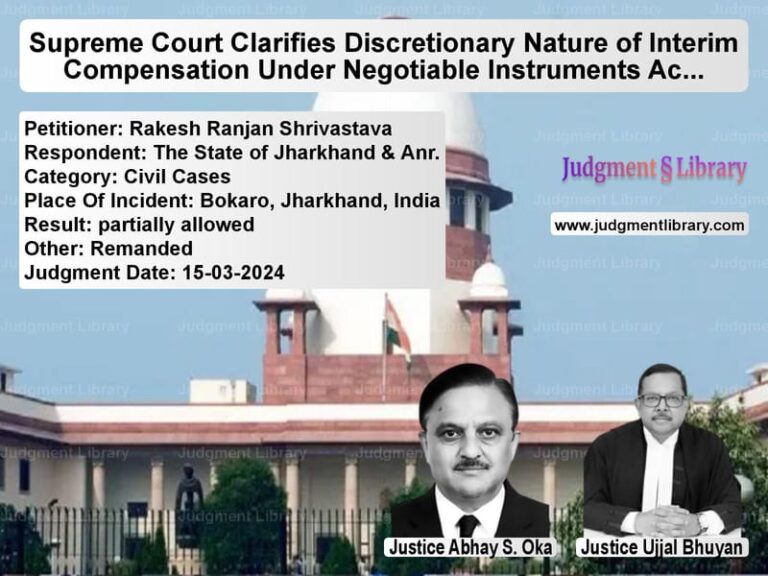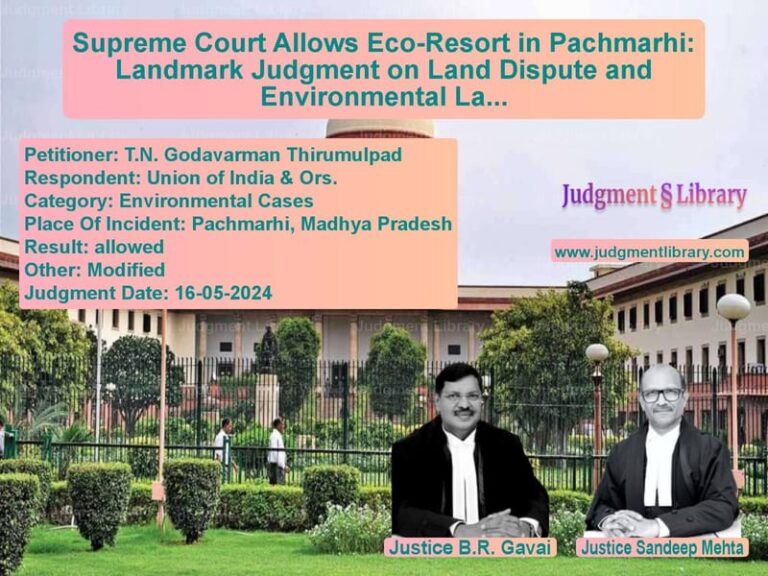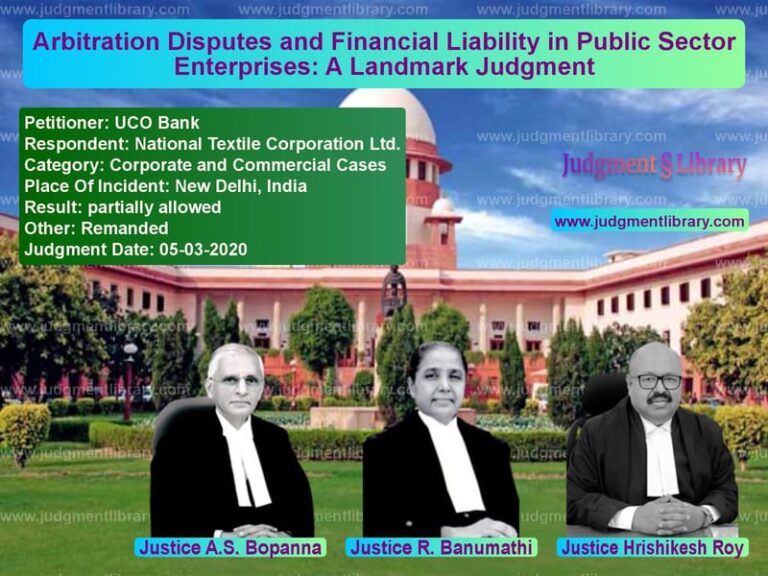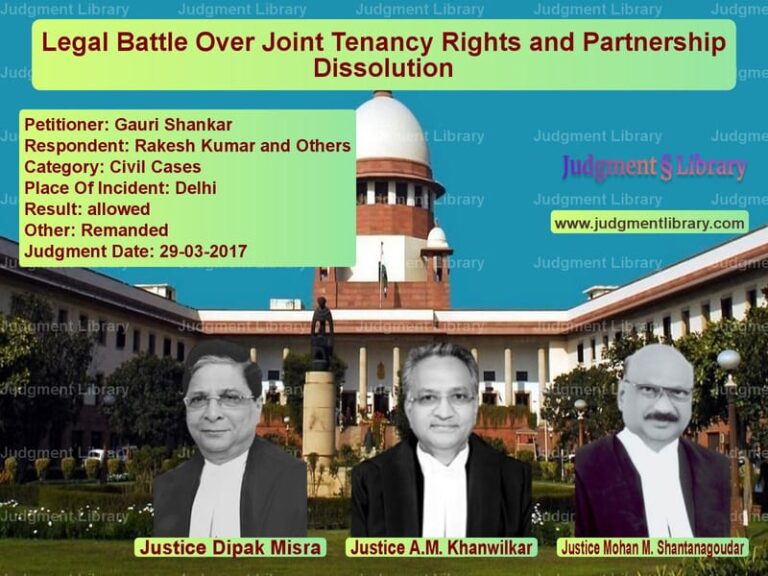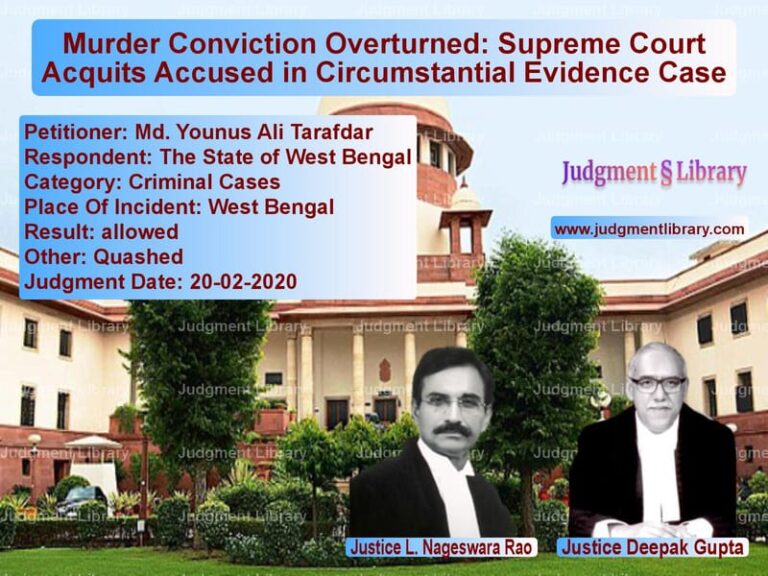Supreme Court Rules on Panchayat Election Disqualification: No Appeal Against Collector’s Decision
The Supreme Court of India recently ruled in the case of Shobhabai Narayan Shinde vs. The Divisional Commissioner, Nashik Division, Nashik & Ors., addressing the legality of an appeal filed before the Divisional Commissioner against a Collector’s decision rejecting the disqualification of a Panchayat Sarpanch and Member under the Maharashtra Village Panchayats Act, 1959. The judgment clarifies that no appeal lies against the Collector’s refusal to disqualify a candidate for failure to submit election expenses, thereby reinforcing the finality of such decisions under the Act.
Background of the Case
The appellants, Shobhabai Narayan Shinde and another individual, were elected as Sarpanch and Member of the Village Panchayat, Kusumba, Taluka, and District Dhule, Maharashtra, following elections held in September 2018. Respondent No. 2, a contesting candidate, filed dispute applications before the Collector, alleging that the appellants had failed to submit their election expenses in the manner prescribed by the State Election Commission.
Section 14B(1) of the Maharashtra Village Panchayats Act, 1959, provides that failure to submit election expenses without valid justification can lead to disqualification from holding office. The Collector, after reviewing the case, rejected the applications on February 5, 2019, citing a lack of merit in the allegations.
Aggrieved by the Collector’s decision, Respondent No. 2 filed an appeal before the Divisional Commissioner, Nashik. The Divisional Commissioner overturned the Collector’s ruling on July 15, 2019, disqualifying the appellants from their positions. Challenging this decision, the appellants filed writ petitions before the Bombay High Court, which dismissed their petitions and upheld the Divisional Commissioner’s order.
The matter was subsequently taken to the Supreme Court.
Arguments by the Petitioner (Shobhabai Narayan Shinde & Another)
- The appellants argued that Section 14B of the Maharashtra Village Panchayats Act does not provide for an appeal against the Collector’s decision rejecting disqualification applications.
- They contended that the Divisional Commissioner lacked jurisdiction to entertain such an appeal.
- The appellants maintained that under the law, the only power available to the Divisional Commissioner was to remove or reduce the period of disqualification once a candidate had already been declared disqualified.
- They argued that the High Court erred in holding that an appeal was maintainable in such cases.
Arguments by the Respondent (Dispute Applicant/Complainant)
- The respondent argued that the Collector’s decision should be subject to review to ensure that election laws are not circumvented.
- He maintained that the Divisional Commissioner had the authority to entertain an appeal, as Section 14B(2) empowers him to adjudicate on disqualification matters.
- The respondent cited precedents where appellate authorities reviewed decisions of subordinate officers in election-related disputes.
Observations of the Supreme Court
The Supreme Court bench, comprising Justices A.M. Khanwilkar and C.T. Ravikumar, analyzed the provisions of the Maharashtra Village Panchayats Act, 1959, and concluded that the Divisional Commissioner lacked jurisdiction to entertain an appeal against the Collector’s refusal to disqualify a candidate.
The Court ruled:
“No remedy of appeal is envisaged against an order of the Collector rejecting an application for disqualification under Section 14B(1) of the Maharashtra Village Panchayats Act, 1959.”
It further noted:
“An authority rejecting the proposal regarding disqualification cannot sit in appeal over its own order of rejection.”
Regarding the powers of the Divisional Commissioner, the Court clarified:
“The powers under Section 14B(2) of the Act are confined to removing or reducing the period of disqualification already imposed. They do not include the power to entertain an appeal against the Collector’s refusal to impose disqualification in the first place.”
The Supreme Court also observed:
“There is no express power given to the Divisional Commissioner to review or reconsider the Collector’s decision. In the absence of statutory provisions allowing an appeal, no such jurisdiction can be assumed.”
The Court found that the High Court had erroneously upheld the Divisional Commissioner’s jurisdiction and concluded that the High Court’s reasoning was flawed.
Final Judgment
- The Supreme Court set aside the Bombay High Court’s judgment.
- The Divisional Commissioner’s order disqualifying the appellants was quashed.
- The Collector’s order rejecting the disqualification applications was restored.
- The Supreme Court held that the Maharashtra Village Panchayats Act does not allow an appeal against the rejection of a disqualification request.
Implications of the Judgment
- The ruling clarifies that no appeal lies against a Collector’s refusal to disqualify a candidate under Section 14B of the Maharashtra Village Panchayats Act, 1959.
- It reinforces the principle that statutory appellate remedies must be explicitly provided and cannot be assumed by implication.
- The judgment prevents unnecessary litigation by ensuring that election disputes are resolved within the statutory framework.
- It upholds the finality of the Collector’s decision in cases where disqualification applications are rejected.
- The ruling provides clarity on the role and jurisdiction of the Divisional Commissioner under the Act.
Petitioner Name: Shobhabai Narayan Shinde.Respondent Name: The Divisional Commissioner, Nashik Division, Nashik & Ors..Judgment By: Justice A.M. Khanwilkar, Justice C.T. Ravikumar.Place Of Incident: Nashik, Maharashtra.Judgment Date: 04-01-2022.
Don’t miss out on the full details! Download the complete judgment in PDF format below and gain valuable insights instantly!
Download Judgment: shobhabai-narayan-sh-vs-the-divisional-commi-supreme-court-of-india-judgment-dated-04-01-2022.pdf
Directly Download Judgment: Directly download this Judgment
See all petitions in Legislative Powers
See all petitions in Public Interest Litigation
See all petitions in Judgment by A M Khanwilkar
See all petitions in Judgment by C.T. Ravikumar
See all petitions in allowed
See all petitions in Quashed
See all petitions in supreme court of India judgments January 2022
See all petitions in 2022 judgments
See all posts in Election and Political Cases Category
See all allowed petitions in Election and Political Cases Category
See all Dismissed petitions in Election and Political Cases Category
See all partially allowed petitions in Election and Political Cases Category

